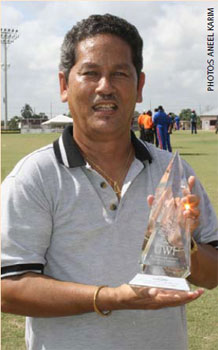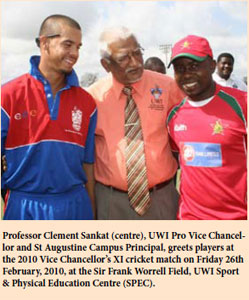 |
 |
 |
|
March 2010
|
Vice Chancellor’s Honor: Citation in honour of Larry Gomes
Men like Larry Gomes come from a special breed that is quickly drifting from sight, because they never seek the limelight and proceed about their business in a purposeful manner—committed to their cause without fanfare. To fully understand the enormous impact that such a character and demeanour had on West Indies cricket, we have to think back and recall the flavour of the game at the time he joined it, and the characters who were star players. For Larry Gomes made his Test debut at Trent Bridge, England in June 1976, under the powerhouse, Clive Lloyd, and in that legendary team of coast to coast champions like Viv Richards, Michael Holding, Roy Fredericks, Gordon Greenidge, Alvin Kallicharran and Andy Roberts, just to name a few. All of them had already stamped deep impressions on the game; had already begun their historic journeys to greatness. On top of that, the fierce rivalry with the English had been further stoked by Tony Greig’s remark before the series that he would make the West Indies grovel. With his 23rd birthday a month away, Larry Gomes was entering a heated battle of titans. It was important that the left-handed batsman keep his head or he would lose his place. In the first match alone, Viv Richards made 232 with his partner Kallicharran scoring 97. Larry made a duck and did not have to bat again, and though it wasn’t all bad; his four seasons at Middlesex came to an abrupt end that season, adding to the pressure. In today’s world, he might not have had another chance—and he almost didn’t—but destiny has a way of plonking herself down on your lap. World Series Cricket offered him a second shot as he was one of the few players with experience during those controversial times. In the Australia tour of 1977-78, he struck two brilliant centuries—101 and 115—and then went to India where he kept his average over 40. It should have reserved him a place in the Test team once World Series Cricket ended, but he was mostly kept on the benches until he was omitted from the England tour in 1980 and the Trinidadian public protested with black arm bands.
It is ironic that today commentators around the world freely describe players with those qualities as Larry Gomes. Ironic, because that was not his original style. In his early days as a Trinidad and Tobago player, he was known as an attacking player. It was when he joined the West Indies team, he said, he had to hold the fort as one of the few experienced players. Telling an Indian newspaper that his style suffered, but the team benefitted, Larry said, “If I played too many shots, I would be out of the team because there were too many players waiting on the sidelines for your place.” So in the end, the Larry Gomes we know and respect as the calm, dependable force within a stable full of high-strung thoroughbreds, was really suppressing his natural instincts in favour of the greater good. And that is the dependability that has made him an outstanding icon of an era of West Indies cricket, and The University of the West Indies is proud today to honour his contribution. |

 Today, we are privileged to pay tribute to a gentleman who has brought honour to West Indies cricket and who has left such a distinctive mark on its otherwise flamboyant face that an entire style bears his name. Not his given name—Hilary Angelo Gomes—but the one the world has come to recognise as synonymous with stolidity, persistence, calm, reliability and thoughtfulness, Larry Gomes, Mr Dependable.
Today, we are privileged to pay tribute to a gentleman who has brought honour to West Indies cricket and who has left such a distinctive mark on its otherwise flamboyant face that an entire style bears his name. Not his given name—Hilary Angelo Gomes—but the one the world has come to recognise as synonymous with stolidity, persistence, calm, reliability and thoughtfulness, Larry Gomes, Mr Dependable.  In the eighties though, Larry found a more consistent place and cemented it by very often gathering up the team when it seemed ready to crumble and carrying it slowly and steadily to respectability. He was named Wisden Cricketer of the Year in 1985, and in its citation, his resilience and dedication were praised along with his steady, anchoring persona, that avoided extravagance in favour of prudence. It is what gained him the name of Mr Dependable in his Test career of 60 matches, 3,171 runs, nine centuries and a highest score of 143 runs between 1976 and 1987.
In the eighties though, Larry found a more consistent place and cemented it by very often gathering up the team when it seemed ready to crumble and carrying it slowly and steadily to respectability. He was named Wisden Cricketer of the Year in 1985, and in its citation, his resilience and dedication were praised along with his steady, anchoring persona, that avoided extravagance in favour of prudence. It is what gained him the name of Mr Dependable in his Test career of 60 matches, 3,171 runs, nine centuries and a highest score of 143 runs between 1976 and 1987.